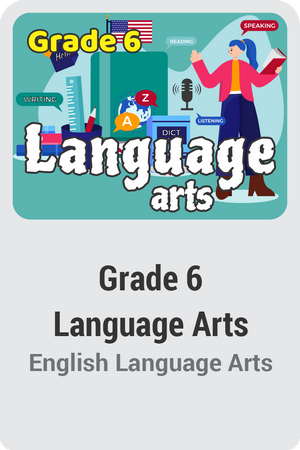
Course Overview:
Through a merging of the past and the present, students in the Grade 6 Language Arts course study classical and contemporary texts and examine the lasting influence of each. Students acquire a foundational understanding of the reading, writing, language, and speaking/listening skills necessary for success in college, career, and beyond. Students become critical readers and thinkers as they delve into rigorous and engaging literary and informational texts by examining the author's rhetoric and purpose through close readings, interactive practice, and formal assessments. They also learn to write effective narrative, informational, and argumentative pieces through the repeated practice of planning, drafting, revising, and editing their written work.
Prerequisites:
Grade 5 (Recommended)
Required Materials:
Students need to supply the following materials to complete the coursework.
Required:
- Disk space on your computer as well as external devices to back up your files (flash drive, external hard drive, etc.)
- Word processing program (Microsoft Word or similar)
Students will read an independent reading selection in Segment 2 from a list of options provided by instruction.
*Students are responsible for obtaining their independent reading selection.
Free Downloads:
- Java
- Windows Media Player
- Apple iTunes
Syllabus:
Segment One
- Reading Comprehension/Informational & Expository Writing/Argumentative Writing
- Developing an idea
- Identifying theme
- Recognizing plot pattern
- Comparing and contrasting mediums
- Using context clues
- Developing thesaurus and dictionary skills
- Identifying implicit and explicit meaning
- Finding the main idea
- Writing an effective summary
- Assessing internet sources
- Reading informational texts
- Researching and organizing information
- Avoiding plagiarism and citing sources
- Writing an introduction
- Connecting and supporting ideas
- Writing a conclusion
- Revising and reflecting
- Using formal language in writing
- Writing effective transitions
- Using signal phrases
- Writing a strong introduction
- Correcting dangling modifiers
- Using transitions and signal phrases
- Maintaining formal style
- Writing a solid conclusion
- Revising and reflecting
- Proofreading and editing
- Selecting effective digital media
- Using spelling rules
- Paraphrasing a text
- Determining relevant information
- Identifying figurative language
- Understanding rhetorical appeals
- Analyzing universal themes across time
Module 01: Getting the Big Picture
- 01.00 Getting the Big Picture Checklist
- 01.01 The Plot Thickens
- 01.02 Plotting It Out
- 01.03 Making Connections
- 01.04 What Does It Mean?
- 01.05 Choose Your Words
- 01.06 Implicit or Explicit Evidence
- 01.07 What is the Big Idea?
Module 02: Relaying Information
- 02.00 Relaying Information Checklist
- 02.01 Organize Ideas in Informational Writing
- 02.02 Gather and Check Your Information
- 02.03 Cite Your Sources
- 02.04 Introduce Your Ideas
- 02.05 What’s Your Big Idea?
- 02.06 Don't Leave It Hanging
- 02.07 Wrap Up Your Ideas
- 02.09 Publish and Polish Your Work
Module 03: The Power of Language
- 03.00 The Power of Language Checklist
- 03.01 Getting to the Point
- 03.02 Multiple Views
- 03.03 Your Idea in Pictures
- 03.04 Figuring Out Figurative Language
- 03.05 Pieces to the Puzzle
- 03.06 The Appeal of Rhetoric
- 03.07 Recognizing Rhetoric
Segment Two
- Reading Comprehension/Informational & Expository Writing/Argumentative Writing
- Recognizing logical fallacies
- Identifying elements of an effective claim
- Effectively supporting a claim
- Identifying reliable sources
- Organizing an argument
- Determining the central/main idea
- Using elaborative details
- Writing a summary
- Understanding how figurative language affects meaning and tone
- Interpreting figurative language
- Finding literal and figurative meaning
- Comparing and contrasting texts
- Using context clues
- Interpreting implicit and explicit meaning
- Identifying characteristics of poetic forms
- Looking for connotative meanings
- Analyzing plot pattern
- Identifying protagonist and antagonist
- Classifying direct and indirect characterization
- Determining point of view
- Defining types of conflict
- Determining theme in a text
- Using pronouns correctly
- Correcting errors with hyphens
- Identifying verbals
- Using correct pronoun/antecedent agreement
- Creating a commercial
- Using diverse media formats
- Recognizing point of view
- Identifying the narrator
- Planning narrative writing
- Writing the exposition to a narrative
- Using narrative techniques
- Discovering a writer's craft
- Writing dialogue effectively
- Revising and editing for impact
- Reflecting on the writing process
Module 04: Artful Argumentation
- 04.00 Artful Argumentation Pretest
- 04.01 Making Arguments That Matter
- 04.02 Organize and Introduce Your Argument
- 04.03 Show Some Support
- 04.04 Your Argumentative Rough Draft
- 04.06 Perfect Your Final Draft
- 04.07 Misguided Arguments
- 04.08 Help with Hyphens
Module 05: A Novel Approach
- 05.00 A Novel Approach Checklist
- 05.01 Influencing Poetry
- 05.02 Meaningful Figurative Language
- 5.03 Nice to Meet You
- 5.04 Get Versed in Verbals
- 5.05 The Turning Point
- 05.06 Pronoun Problems Solved
- 05.07 That's a Wrap
Module 06: Telling Tales
- 06.00 Telling Tales Checklist
- 06.01 Mix It Up
- 06.02 Planning a Narrative
- 06.03 Begin Your Narrative
- 06.04 Writing a Noteworthy Narrative
- 06.05 The Writer's Craft
- 06.06 Dare to Compare
- 06.07 Publishing Your Narrative


